

Celebrates 60th birthday and hosts an informal dinner with daughter Elsie, for those of his Cabinet colleagues who are in Canberra.1
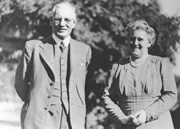
JCPML. Records of the Curtin Family. The last photograph of John and Elsie Curtin, taken at the Lodge, Canberra, 1945. JCPML00004/36
Mrs Curtin arrives and remains at Lodge until 5 July, except for one week in February when she visits Adelaide to open the interstate Labor Women’s Conference.2
Resumes duties as Prime Minister and Defence Minister
Holds first press conference since his illness which covers:
- Policy on nationalisation of airlines
- Australian operations in the islands
- Submarines in the Bismarck Sea and Torres Strait.
Makes statements on:
- government control of internal civil aviation routes.
- the use of Australian Forces in the Pacific area and pays a tribute to General MacArthur.
‘…On this, the first day of my return after my illness, I feel a sense of deep admiration for General MacArthur for the extraordinary success that has attended the carrying out of his plan and the extraordinarily low cost in casualties that has so far marked them. He has kept the enemy guessing, not only in respect of point of attack but also in point of time. That this should have involved a certain amount of reticence in respect of the use of certain forces is, I think, understandable. It has had my entire approval.’
Makes prime ministerial statement on preference in employment for fighting forces. 3Makes statements:
- on post-war plans for a trans-Pacific air passenger service.
- denying government policy had socialized Australia. 5
Holds press conference and discusses:
- the exchange of American and Australian forces in the Solomons and New Guinea.
- Source of newspaper reports published in Tokyo on Australian operational matters.
- Naval operations and shipping.
Writes to his daughter that ‘he feels alright now & in view of the weather during the week we can regard this first week as a good, even a hard, test’.
Speaks to members of the Diplomatic Corps, who pay him an official call at Parliament House, in honour of Australia Day.
Makes statement on the breadth and work of the Board of Inquiry into the coal industry.
Announces damage to HMAS Australia and HMAS Arunta by enemy air attacks during the invasion of Luzon.
Receives Australia Day message from Generalissimo Chiang Kai Shek and responds. 7Announces arrival in Australia of the Duke of Gloucester who is to assume the office of Governor-General. The Duke was accompanied by the Duchess of Gloucester and their two children, Prince William and Prince Richard. 8 |
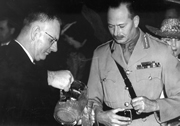
JCPML. Records of West Australian News Ltd. PM John Curtin pours a drink of fruit cup for Australia's new Governor-General, HRH The Duke of Gloucester, 1945. JCPML00409/18
Together with Mrs Curtin, greets the Duke and Duchess of Gloucester when the Duke is sworn in as Governor-General.
With Mrs Curtin holds a reception at Parliament House for the Governor-General, the Duke of Gloucester and the Duchess of Gloucester, at which ‘there were full curtseys, bows, bobs, formal hand shakes and friendly “hand waggles”.’
Signs proclamation concerning the Duke of Gloucester’s appointment as Governor-General. 9
Attends meeting of Federal Cabinet
Mrs Curtin holds her first press conference in Canberra for more than three years. Women representatives of newspapers from several States were present, to hear Mrs Curtin tell, ‘of meeting with Royalty.’
Announces Full Cabinet decision to re-appoint Mr F G Thorpe as Public Service Commissioner. 10Announces:
- Full Cabinet decision to make temporary reduction in the ration scale of meat, as drought conditions had resulted in a decline in production.
- alterations in ministerial duties.
- Full Cabinet decision to include Maltese service personnel in the proposed free passage scheme for British ex-servicemen and women.
Opens and speaks at conference between representatives of the Government and manufacturers, stating that ‘some big post-war problems could be overcome only by retaining, in modified form, the machinery for controlling prices, for establishing priority in the building industry, and for preventing unnecessary overseas expenditure.’
Sends message to General MacArthur on the fall of Manila.
‘Heartiest congratulations to you and to all under your command on this great day. One more important march towards the goal you have set yourself with such inflexible purpose has been completed. Our thoughts are with you and we pray that your great final purpose will not be long in fulfilment.
All Australians will give heartfelt thanks for the latest success to crown Allied arms and will take new resolution to see through the tasks that lie ahead. Manila is once more in Allied hands, but the enemy still holds a grip on many millions of enslaved people; the homeland of Japan still stands. Australia's rejoicing can best be expressed by complete devotion to duty until the last blow is struck.’ 14Receives reply from General MacArthur in response to message sent on the fall of Manila.
‘Your generous message warms my heart just as your calm and unflinching support of the past has so often comforted and sustained me in lonesome hours of isolated decision.’ 15Responds to telegram from Mr Fadden agreeing to hold a conference with primary industry, but seeking consultation with Fadden before a final decision is reached.
Makes statements on:
- agreeing to see representatives of the Australian Coal and Shale Employees Federation and the Australasian Council of Trades Unions.
- alterations to ministerial duties. 16
Attends meeting of War Cabinet which decided ‘significant changes in the allocation of Australian man-power would be impracticable in the immediate future’.
Receives telegram from Mr Fadden expressing appreciation on agreement to hold a conference with primary industry.
Makes statement reviewing war commitments and manpower:
‘I do not see, at present, that the allocations of man-power can be altered. The civil economy of this country has had to meet, in recent weeks, an intensification of the prosecution of the war against Japan. The economic requirements of increasing the pressure against Japan from Australia as a base are very considerable.
I refuse to believe that the Australian people have suffered unduly. They have been free from bombing and the like, and have been fortunate people. All they have had to do during the war is to work a little harder. At the same time, I do not forget the anguish of the kith and kin of the fighting men. I could recite a long list of industries and occupations in which no longer hours have been worked in war than in peace.
I am waiting for a new phase of the war to be clear so that I can obtain a better picture of its military requirements. Australia has to fill the commitments entered into and the labour power, in support of the military obligation, is part of the military obligation. These plans have to be completed before a review can be planned.
While the stresses and strains of the struggle to preserve our liberty persist, and will continue for some time, it is more clear that what has been done has been done so well as to give confidence in a shorter struggle than a year ago could have been contemplated. The capacity of the enemy to hold out - on his own basis - must be less than what it was a year ago.’ 17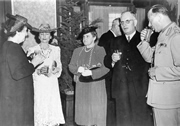
JCPML. Records of the Curtin Family. John and Elsie Curtin with Duke and Duchess of Gloucester Canberra February 1945. JCPML00376/76
Attends resumption of Parliament.
Makes statement on what he regards as ‘a most revealing communiqué, [issued by Mr Churchill, Prime Minister of Great Britain, President Roosevelt of the United States of America, and the Chairman of the Council of Peoples Commissars of the Union of Soviet Socialist Republics, Marshall Stalin] indicative of the most intimate concert in the conduct of operations against Germany, and making a completely maximum use of the pooled resources and a complete co-ordination of the military capacity of the three great powers’. 19
![]()
Makes statement on further Australian survivors of sinking of Japanese transport on 12 September 1944.
‘No details have been provided by the Japanese as to the time, place or the circumstances under which the men were rescued. Other survivors from the Japanese transport, who arrived in Australia in October, 1944, reported that a number of men, including some now reported as rescued by the Japanese, had last been seen assisting in launching a lifeboat or in the water making their way back to the sinking vessel. The survivors had believed that the probability of the recovery of any of these men was remote. However, it is now considered that the rescued men most likely comprise those who had succeeded in boarding lifeboats. None of the personnel rescued by the Japanese can be identified as having been seen on the rafts.
Unhappily, there are no known grounds for relatives of other missing men to build up hopes that further rescues may have been made.’ 202.30 pm - ? and 4.30 pm - ?
Chairs meetings of Federal Parliamentary Labor Party, and suggests an adjournment until the arrival of a number of Members whose non-arrival was due to a late train. This was agreed to.
Advises the Party of what had to be done before Parliament met. He also made a general statement on the war position and a brief reference to renewals of overseas Loans falling due during the year. Second meeting adjourned.
Announces delegation to represent Australia at the United Nations' conference in San Francisco.
Makes statement on the amalgamation of the Ministry of Post-war Reconstruction and the Department of War Organization of Industry, under Mr Dedman as Minister for Post-war Reconstruction. 2210.30 am - ?
Chairs resumed meeting of Federal Parliamentary Labor Party.
Makes statement on the reasons for the delay of Japan’s southward thrust.
‘Insofar as I am able to judge strategy, I believe in my heart that the delay to Japan's southward thrust involved in the gallant deeds of those men who held out in Bataan and Corregidor did contribute to the breathing space which was vital to us.
…
That brings us to a consideration of all the men whose lives have been sacrificed in delaying and holding the enemy's numerous thrusts in the forward movements in the global war at a time when we were weak and unready. Time has been bought by the lives of the gallant dead.’
Makes statement indicating that arrangements had been completed for the official opening by the Governor-General, of the graving dock at Garden Island, New South Wales, on 24 March, 1945.
Announces arrangements for the celebration of Red Army Day on 23 February 1945. 24Arrives at Parliament House, with Mrs Curtin.
Makes statements on:
- the authority of the Government over Australian forces.
- proposed discussions concerning the wool agreement and the post-war management of wool stocks.
- the resignation of members from the Advisory War Council.
? – 6.8 pm
Chairs meeting of Federal Parliamentary Labor Party.
Makes statements:
- on treatment of Allied prisoners of war and civilians who are recovered from the enemy by the Australian Military Forces.
- indicating refusal to provide a Federal Government House in any State for the Governor-General to ‘sojourn by the ocean’. 26
Responds to questions concerning plans on the war in the Pacific and South East Asia. Then refers Australian post-war foreign policy with particular reference to the forthcoming international conference at San Francisco.
Makes statements:
- on foreign policy of the Government.
- reviewing war commitments and manpower, and the war effort. 27
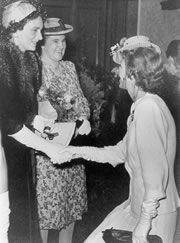
JCPML. Records of the Curtin Family. Mrs Percy Spender is presented to the Duchess of Gloucester at a luncheon given by Mrs Elsie Curtin. 1 March 1945. JCPML00376/74
Mrs Curtin gives a tea party in honour of the Duchess of Gloucester.
Makes statement indicating refusal to discuss engagements of AMF.
‘I do not propose to tell, because I do not wish the enemy to be advised. There has been too much talk already.’ 29Makes statements:
- on pecuniary benefits to service personnel decorated for gallantry.
- on, and releases a report of, the Regulations Advisory Committee concerning aspects of National Security (Landlord and Tenant) Regulations. 30
Announces that ‘Owing to the unfortunate accident to the Minister for the Navy, Munitions and Aircraft Production (Mr Makin), the Postmaster-General (Senator Cameron) will take over the duties of those portfolios.’
Makes statement on temporary employment of staff in Commonwealth offices to relieve staff shortages. 31Announces:
- a decision of Full Cabinet to provide an additional grant for drought relief to farmers.
- War Cabinet decision to approve expenses for the Army Education Service for the current year.
Makes statements on:
- the decision of Cabinet to list a Commonwealth-wide miners' pensions scheme in the terms of reference of the Board of Inquiry.
- Full Cabinet decision that the Department of Munitions would be responsible for the administration of the Aluminium Industry Act.
- Full Cabinet decision to appoint a managing director for the statutory authority to operate interstate airlines, and authorization for Qantas to re-establish a service between Sydney and New Guinea.
- Full Cabinet decision on Qantas operations and the services between Britain and Australia.
- Full Cabinet approval of the establishment of a National Mapping Council. 32
Makes statements:
- refuting allegations of deficiencies in the equipment of the AMF.
- indicating consideration given to no longer issuing some currency notes of a certain denomination and exchanging others for new notes. 35
Makes national broadcast, appealing to Australians to over-subscribe the £100 million Third Victory Loan before April 25. 36
Attends luncheon to farewell the Chinese Minister in Australia, Dr Hsu Mo, who was being transferred to Turkey.
Announces he would only answer questions from party leaders, as he was in no condition ‘to be bobbing up and down in his seat at minute intervals’.
Makes statement on London Conference to decide on disposal of accumulation of wool purchased by the British Government.
Announces acting ministers during the visit of Mr Forde and Dr Evatt to Britain and USA. 39Attends meeting of War Cabinet which decided that ‘members of all Services should be credited with war service leave for “service abroad”.’
Makes statements on:
- War Cabinet decisions on leave entitlements and payments in lieu of leave to members of the fighting forces on discharge.
- Full Cabinet approval of a payment for drought relief to cereal growers in Western Australia.
- Cabinet adoption of proposals concerning the advancement of the wool and wool textile industry and provisions for post-war training, to be discussed at a forthcoming conference.
Makes statements on:
- a general examination made of the capacity of Australia to provide additional supplies of meat to Britain.
- Commonwealth Government arrangements for the conversion of London loans. 42
10.30 am? – 12.50 pm
Chairs meeting of Federal Parliamentary Labor Party.
Makes statements:
- announcing a check on the method used to estimate the subsidy for milk producers in Sydney and Newcastle.
- on improving co-operation between members of the Commonwealth.
10.30 am? – 12.30 pm
Chairs meeting of Federal Parliamentary Labor Party.
Makes statements:
- on world food supplies and the attendance of the Australian Minister in Washington to a conference in Washington to determine what steps can be taken to cut food consumption.
- denying press report suggesting interference in preparations to celebrate the end of the war in Europe.
- on casualties suffered by the AMF in the operations in New Guinea, the Solomons and New Britain from November 1944 to 17 March 1945. 47
Makes statement on:
- the progress of subscriptions to the Third Victory Loan.
- the contravention by Japan of Article 9 of the International Convention that no prisoner may be sent to an area exposed to fire.
Makes statement on Full Cabinet approval of a Commonwealth grant to provide a water supply and a crushing and drying plant for Leigh Creek coalfield, SA.
Announces candidates selected as diplomatic staff cadets. 49Makes statement on General Sir Thomas Blamey’s visit to operational areas, and his assurance that AMF equipment is superior to that of the enemy.
Announces visit by Acting-Minister for the Army (Senator Fraser) to operational areas in which Australian forces are engaged.
Makes statement on inability to reduce taxation due to the high costs of war. 50Sends message to Australian troops through Acting Minister for the Army, Senator Fraser, who is visiting areas in which they are operating.
‘The Australian Government and people have ever had cause to be proud of their fighting forces. In this war, new names have been emblazoned on the banners of Australian units to join those made sacred in our memory in 1914-18. The phase through which the Pacific war is now passing finds places such as New Guinea, New Britain, Bougainville and the Solomons having the strongest impact on our minds and our emotions. Our thoughts are constantly with you. Your Government knows the obstacles in your path - the tenacious and ferocious enemy, a shocking climate, a difficult supply line and a heart-breaking terrain. The Acting-Minister for the Army (Senator Fraser) has come to you at my request to ensure that what can be done, will be done. I ask that you do not hesitate to tell him fully what he should know. That God will watch over you and protect you is the hope and prayer of every Australian.’ 51Makes statements:
- denying that the appointment of General Douglas MacArthur as Commander-in-Chief of all ground forces in the Pacific affects his role as Commander of all forces in the South West Pacific Area.
- on the progress of subscriptions to the Third Victory Loan.
- on reduction in taxation and hours of work.
Holds press conference which discusses:
- Curtin’s attitude to the celebration of peace in Europe.
- The independence of the ABC.
Makes statements on:
- attendance of Australian personnel at a conference on food supplies and consumption in Washington.
- the prosecution of coalminers in wartime:
Makes statements on:
- the establishment of a national university in Canberra.
- the United Nations Conference on International Organization in San Francisco and the determination of mandates. 54
Announces the appointment of Mr R J F Boyer as Chairman of the Australian Broadcasting Commission.
Makes statements on:
- representations requesting that the Commonwealth Government accept offers of meat or money to enable increased exports to be sent to Britain.
- casualties to all ranks of the armed forces of the British Commonwealth and Empire from the outbreak of war to 28 February, 1945.
- appropriate forms of celebration for the ending of the war in Europe.
‘The keynote will be thankfulness, rather than boisterousness. The authorities will do nothing to discourage private rejoicings, but official celebrations will not be on the large scale which some people anticipated. This restraint is to be observed because, with Germany's defeat, the war will be only partly over. It is felt that it would be unfair to relatives of the many thousands of British troops abroad if elaborate celebrations were held. Full-scale rejoicings will be postponed until the war is really over. That represents my view.’
Announces that the Australian Minister to the Union of Soviet Socialist Republic, (Mr J J Maloney) has arrived in Australian on short furlough.
Death at Warm Springs, Georgia, of Franklin Delano Roosevelt, 32nd President of the United States. (Born 30 January 1882). 55Makes statements on:
- the progress of subscriptions to the Third Victory Loan.
- the freedom of the Australian Broadcasting Commission with regard to contracts and the law.
Announces arrangements to mark the death of President Roosevelt. 57
Makes statement on broadcast by General Blamey (15 April 1945) answering criticism of AMF equipment.
‘I think that, as the Commander-in-Chief of the Australian Military Forces (General Sir Thomas Blamey) has been criticized severely, he should be allowed to state his case as freely as have the critics. The critics, surely, cannot object to being criticized. I had no consultation with General Sir Thomas Blamey before he made his broadcast on 15th April, 1945. As for comment on it, I merely say that it is always interesting to observe how critics react to criticism.’
Announces:
- that Acting Minister for the Army (Senator Fraser) would report on his visit to areas in which Australian troops are operating, on 19 April 1945.
- appointment of Vice-Admiral Sir Louis Hamilton as First Naval Member of the Commonwealth Naval Board.
Makes statements on:
- Full Cabinet decision to amend National Security (Racing Restriction) Regulations to remove the ban on the publication of nominations for race meetings before the declaration of weights and the ban on the publication of information concerning interstate race meetings.
- on reciprocal lend-lease expenditure and aid by Australia to the United States. 60
Informs the House of the death of the President of the US, Franklin Delano Roosevelt. Outlines the important role played by Roosevelt in the conduct of the war, particularly in the Pacific.
Moves motion supported by the Leader of the Opposition (Mr Menzies) and the Leader of the Country party (Mr Fadden):
‘That this House records its sincere regret at the death of Franklin Delano Roosevelt, President of the United States of America, places on record its high appreciation of his devoted and self-sacrificing service to the United Nations in the war to defeat tyranny and aggression, expresses to the people of the United States its profound regret at the loss they have suffered, and tenders its deep sympathy to Mrs Roosevelt and her family in their bereavement.’
Issues order under National Security (Mobilization of Services and Property) Regulations to bakers, and orders legal proceedings against those who refuse to carry on normal baking operations. 61
Issues amendment of order to bakers (to resume baking operations) to cover the whole of Queensland.
[On 22 April, 1945, the Bread Manufacturers Association decided to resume baking on 23 April, 1945.] 63Canberra
Broadcasts over national and commercial stations with the Leader of the Opposition (Mr. Menzies) and the Leader of the Country party (Mr. Fadden) canvassing support for the Third Victory Loan.
‘Men and women of Australia,
…
I ask that the men and women of Australia shall carry on for just a little longer, for what Mr Churchill, in referring to the European struggle, termed “one more heave”. In money, that “one more heave” means filling the £100,000,000 loan by 27th April, 1945. I ask you, however, to fill it by 25th April, 1945, which is Anzac Day, a day that is sacredly Australia's, and a day, now, that has taken on a new significance. For it is on that day that the United Nations Conference on International Organization opens at San Francisco. The hopes of the world are centred on the outcome of that conference.
I ask that, on that day, Australians will signal their appreciation of the importance of that gathering to all mankind by filling the Australian war loan.
Good-night, and God bless you.’ 64
Makes statements on:
- the progress of subscriptions for the Third Victory Loan.
- Australian assistance to Britain to re-establish its export trade. 65
Makes speech on investigations into the standard and quality of equipment supplied to the Australian Military Forces.
Announces Cabinet decision to call a fourth trade union convention. 66Makes statements on:
- The trade union convention and the industrial stoppages.
- Consideration of the right of discharge to members of the forces after certain service.
- The eligibility conditions for the 1939-1943 Star.
- A return to normal private trading. 68
Enters hospital with congestion of the lungs, and may be absent from official duties for at least two months.
The Prime Minister’s medical adviser reports that:
‘The Prime Minister (Mr Curtin) is suffering from congestion of the lungs which requires a period of rest. He has been admitted to a private hospital in Canberra.’
Statement by the Treasurer, Mr Chifley:
‘The Prime Minister has recommended to the Governor-General that I should carry out the duties of Prime Minister during his illness and the absence of the Deputy Prime Minister (Mr Forde).
Mr Curtin has requested the Vice-President of the Executive Council (Mr Beasley), who has been acting as Attorney-General, to carry out the duties of Minister for Defence.’
Adolf Hitler dies. 69Receives visit in hospital from Presbyterian minister Hector Harrison.
‘He said "I'm not allowed to read the papers, not allowed to read anything, for that matter, and don't know what's going on."' 71Has improved considerably and is progressing well.
Allows his name to go forward as a candidate for Fremantle for the 1946 election. 72Acting Prime Minister, Mr Chifley reports to a meeting of the Federal Parliamentary Labor Party that:
‘Mr Curtin was doing very well and was much improved and should at an early date be able to leave hospital. He also stated that he had advised the Prime Minister that it was the Party’s opinion and wish that he should take a complete holiday before returning to his place in the Parliament. This was endorsed by acclamation'. 74Sends message to the President of the MCC on the occasion of the ’Victory Test Match’ 75
Is discharged from hospital and returns to The Lodge.
‘Too weak to climb the stairs, he was carried by stretcher to his bed in the upstairs room.’
Via a recorded message broadcasts in Britain for Empire Day.
‘When victory and peace come, the concert of the British Commonwealth must be no less than it was in war. Further, the brotherhood in arms of the United Nations has in its essence the great hope of brotherhood in peace.
We of the British race have a great responsibility to shoulder and a great contribution to make for the peace. I feel that the British Commonwealth presents an outstanding pattern for the shape of a world organization for security and peace. But it is not enough to take pride in the free association of Britain, the Dominions and the colonies. By our strivings, by our tolerance and understanding and by our associated thinking, we must continue to show the world that the British Commonwealth can be truly for the common weal. We must give a true demonstration of the wider and more effective association that is necessary for peace. We must make our contribution to the making of the peace - consideration for others and a willingness to share with them a world which is, after all, good enough to give each a place in it if only all will observe reason and goodwill towards one another. To that end, let us bend our joint efforts as sovereign members of the British Commonwealth of Nations. To that high purpose let us devote and dedicate ourselves.’ 77Acting Prime Minister, Mr Chifley reports to a meeting of the Federal Parliamentary Labor Party that:
‘Mr Curtin was making satisfactory progress towards recovery. He was asked by the meeting to convey best wishes to the Prime Minister for a speedy and complete recovery on behalf of the Party.' 78Every afternoon the barber from Parliament House calls ‘to shave him while, to pass the time he took to reading the racing pages and offering tips to Ray Tracey [his chauffeur], who recalled, “either by extraordinary luck or uncanny judgement he picked winners”.’
A ‘procession of friends and family trooped in to visit.’ 83Receives visits from Acting Prime Minister, Mr Forde, who has just returned from visit to San Francisco, and the Treasurer, Mr Chifley.
Acting Prime Minister, Mr Forde receives a medical report from Dr J Holt, the Prime Minister's medical adviser, and Dr Geoffrey A Pennington, consultant physician and colonel in the Australian Army Medical Corps stating that:
‘Since the last bulletin concerning the health of the Prime Minister (Mr Curtin) there has been unsatisfactory progress and, during the past two weeks, a deterioration in his condition has occurred. The illness is directly attributable to the illness Mr Curtin suffered in 1944 when his condition was serious.’
Receives visit from Reverend Hector Harrison who tells him his name ‘will be in Australian history books as long as Australia’s a nation for centuries’. Curtin responds:
‘”That’s all right, but don’t forget this: I’ve had a family and I’ve hardly seen them grow up. Been away nearly all the time, especially in the formative years of life.” And that counted a terrific lot to him.' 85Receives an evening visit from Reverend Hector Harrison:
‘It was a quiet, starlit night, moonlight night and I decided to walk across. … I went upstairs and as I entered the room he smiled … I said, “Well I want you to know that a lot of people are praying for you.” And I took his hand and then went off. … When I got home my wife said, “How is he?” I said, “He’ll die tonight.” “How do you know?” “Well,” I said, “his hand was ice cold.”’
Mrs Curtin, ‘had tea with him just before midnight, when he told her, “Go on Mrs Curtin. It is best that you go off to bed now”. Before taking his nightly sedative, he told her “I’m ready now”. She gave him a final kiss and settled down in the next room'. 86
At the Lodge ‘there were two nurses, members of the household staff, and the Prime Minister’s wife Elsie and his son John, the latter being on compassionate RAAF leave. Their daughter Elsie was packed and ready to board an aircraft within an hour, when she received word by telephone that her father had died [at 4 a.m.]’.
Rt Hon F M Forde announces the death of Mr Curtin to a meeting of the Federal Parliamentary Labor Party and moves:
‘That this meeting of the Federal Parliamentary Labor Party learns with deep regret of the death of its great, esteemed and beloved leader, Mr John Curtin; places on record his meritorious service to the Party; and offers Mrs Curtin, his son and daughter, and his relatives, its profound sympathy in their sad bereavement. Seconded by Rt Hon J B Chifley and carried by members standing.’
Mr. Forde said:
'It is my melancholy duty formally to inform honorable members of the tragic death of the Prime Minister (Mr John Curtin).
To-day, the Australian nation mourns and offers to this common man, this son of the people, a tribute of affection, gratitude and honour, which has been offered rarely, even to kings. For this man was truly one with the masses who populate our country. He had striven and struggled among them, and when he came to the highest place in the land he was still one of them'. 87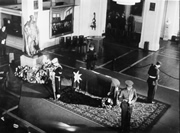
JCPML. Records of the Curtin Family. John Curtin's coffin "Lying in State", King's Hall 1945. JCPML00376/180
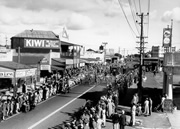
JCPML. Records of West Australian News Ltd. Funeral procession passing through Cottesloe, 1945. JCPML00347/29